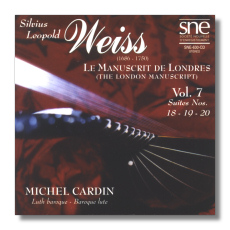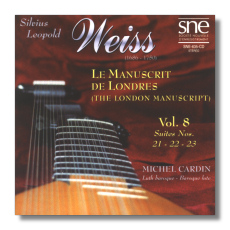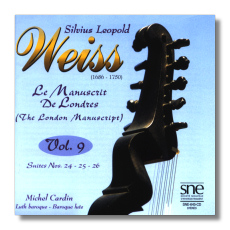
The Internet's Premier Classical Music Source
Related Links
- Weiss Reviews
- Latest Reviews
- More Reviews
-
By Composer
-
Collections
DVD & Blu-ray
Books
Concert Reviews
Articles/Interviews
Software
Audio
Search Amazon
Recommended Links
Site News
 CD Review
CD Review
Silvius Leopold Weiss

The London Manuscripts
Volume 7
- Suite #18 in C Major
- Suite #19 in G minor
- Suite #20 in D Major
Michel Cardin, Baroque lute
Société Nouvelle d'Enregistrement SNE-630-CD


Volume 8
- Suite #21 in C minor
- Suite #22 in F Major "The Celebrated Pirate"
- Suite #23 in A minor "The Infidel"
Michel Cardin, Baroque lute
Société Nouvelle d'Enregistrement SNE-635-CD


Volume 9
- Suite #24 in E Flat Major
- Suite #25 in F Major
- Suite #26 in F Major
Michel Cardin, Baroque lute
Société Nouvelle d'Enregistrement SNE-645-CD
(All CDs also available from Michel Cardin.)
If late Baroque lute music expertly played intrigues you, then do not be put off by the fact that some of the usual online and retail sources may not carry these CDs: head for Michel Cardin's own site. You can get them there.
The first six CDs of this twelve CD series have been very positively reviewed on Classical Net. Now Volumes 7, 8 and 9 have the same strengths. Firstly the quality of the music. If new to Weiss, his variety, intensity and depth and breadth of this late Baroque and somewhat underrated composer's creative innovation may surprise. At time he's redolent of Bach, at others of Mozart and even Handel! At any event, to have all these excellent CDs is to have a wealth of challenging and satisfying music at your disposal.
As before, each CD contains three suites; each lasts around 20 minutes and comprises between five and eight conventional "dance" movements, although Suites 20 (Volume 7) and 21 (Volume 8) each lasts nearly half an hour. The first suite here, Number 18 in Volume 7 is remarkable for the ways it demonstrates the aforementioned variety. Weiss truly was the owner of all he surveyed; and capable of an enormous range of emotion, technique and treasurable inventiveness in just – in this case – five movements lasting a little over 20 minutes. Number 19 experiments with note-doubling harmonies and seems to show just how accomplished Weiss' own playing must have been, and how relaxed his writing could be when he had such an advanced level of control and comfort in that control. Suite 20 does not let us forget the dance for a moment, and may well turn out to be a favorite.
Suite 21 has undergone some reconstructive surgery from the various sources that provide most of the music here. A ragbag, though, it most definitely is not. Unified by a strong C minor tonality, it blends contemplation with… worry! This could be potentially an opportunity for overkill and showiness in a less experienced player's hands. In Cardin's care, it's splendidly poignant and exciting. Suite 22 is one of just two of Weiss' over 90 suites to have been given a title. In this case the eighteenth century pirate, Blackbeard is "celebrated". It's instructive to approach this music expecting a miniature proto-tone poem. There is certainly evocation of exuberance and extroversion. But isn't it rather the case that that a pirate may exhibit such qualities in the popular imagination, than that Weiss sets out to draw that notorious character in texture or tone? An impression of a characterization, not a snapshot. So no clichés, no spurious effects, no showing off. The other suite with a title follows: "The Infidel" (Suite 23) was actually responsible for attracting players and audiences to the Baroque lute, as Cardin acknowledges. It's presumed that the "eastern" intervals (particularly at the start of the fourth movement) account for the title. The suite has a feeling of seriousness to it, pomp almost, and is played with corresponding gravitas.
Volume 9 contains what are actually the last strictly solo suites to be found in the London Manuscript. The pieces contained in Volumes 10, 11 and 12 (to be reviewed here soon) are duos and miscellaneous pieces. Suite 24 we know to have been written at a time when Weiss was visiting Frederick II of Prussia's palace near Berlin (Sans Souci) and may reflect genuine or diplomatically-advantageous sentiments of elation. Suite 25 seems to want to share these feelings and is as outgoing as it is communicative. Again, Cardin avoids the pitfall of lightening the music and its impact by trivializing the hint at dialog that's there if you listen; but does not take over. Lastly, Suite 26 is magisterial, dignified and reflective, almost as if it were latter-day Dowland. Equally as remarkable as the weighty development with which the melodies unfold is the way in which Weiss – again in full control and flow and with an undemonstrative yet unabashed maturity – imposes a deep and satisfying unity on its seven movements. A longer work (at almost 28 minutes), it's a superb way to end this phase of the London manuscript recordings.
Cardin's playing – again – is very much that of an expert, of someone who's immersed themself in Weiss music and made it their own over years by choice, not as an assignment. We all benefit from this. He knows just when to speed up, linger, underline, "adjust" and reproduce plainly. His variations in timbre, volume and attack are those of a settled and confident communicator. There are other recordings and series available – see the references in earlier reviews on Classical Net. Each has something to recommend it. But this is overall the most persuasive, satisfying, evocative and accomplished.
The booklets that come with these CDs are of the same high standard as hitherto: there is a useful little essay on tablature in that for Volume 7, for example. Although this gives the series the aspect of a "labor of love" (which is surely has been), it's extremely professional and authoritative. Much of the narrative in the booklets necessarily concerns provenance and versions. Frankly, this is likely to mean most to a player-specialist and someone interested in manuscripts. But such a wealth of detail is amply supplemented with commentary, musical example and appropriately-embedded critical commentary from Cardin. Indeed, were the subject-matter relating to all the sonatas in the series, one by one, to be aggregated in book form, it would provide a more than serviceable accompaniment to these remarkable and neglected works.
The recordings themselves sustain the previously-established high quality… there is an appropriately close and warm acoustic. Cardin has a real presence yet his playing is not one which over-projects his personality in any undue way. It acts as a justified conduit for the music. Nor is it as though Weiss were watching over Cardin's shoulders. The music has been fully internalized, digested and sifted such that what we hear really seems close to how Weiss surely would have wanted his suites to have sounded had he been able to supervise such a "recording". That blend of integrity and perception on Cardin's part – together with a complete absence of splash, gimmicks and gymnastics in what is actually in places quite virtuosic music – makes these recordings so satisfying. Thoroughly recommended.
Copyright © 2008, Mark Sealey


















